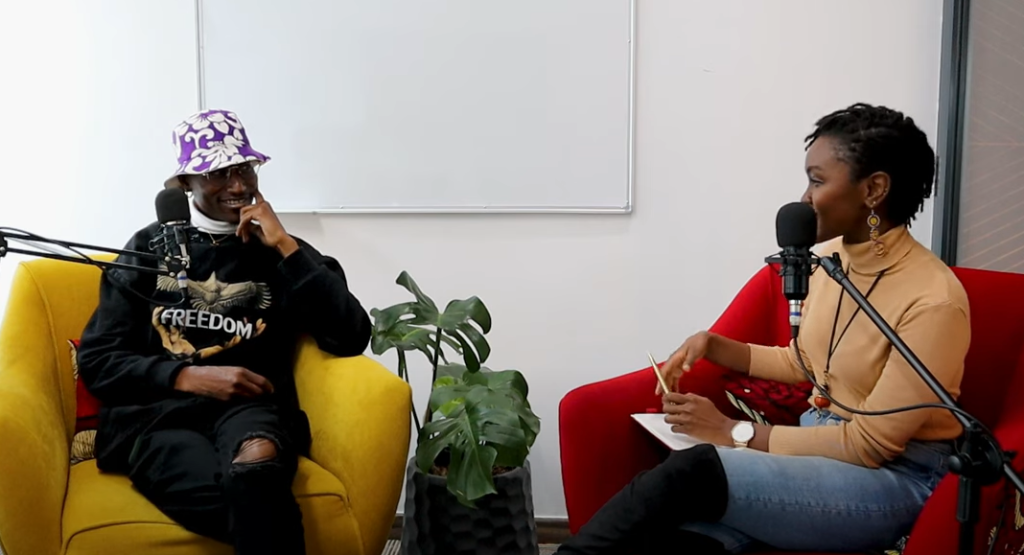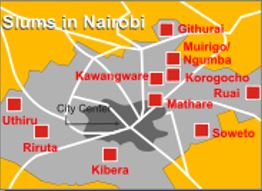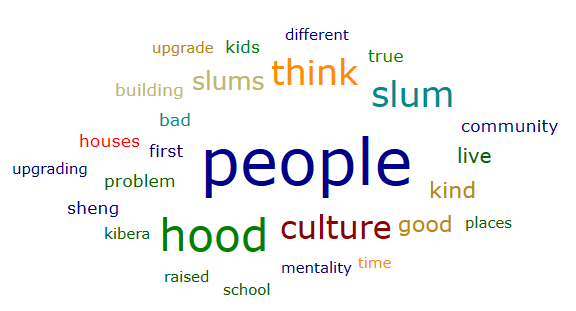
While driving towards the Karen area in Nairobi, I passed an informal settlement on the way. The road was on a higher level and allowed me to look across an area that went for miles. What struck me was how long it took to drive around the outskirts. That was my first introduction to Kibera, the largest informal settlement in Africa. I took it all in, but I felt uncomfortable. Indeed, I have felt myself being uncomfortable with the actual word ‘slum’ which is how the locals in this interview which I am writing about, call their home. I came to realize this feeling stems from what the word can indirectly carry with it, such as poverty, poor housing, sub-standard sanitation, and crime. Today, I can share new associations with this term, with words such as culture, identity, mentality, language, community, and roots. Here is what led to my new understanding.
With a potential opportunity to work in Nairobi, I set about trying to learn more about this sprawling city where 60% of the citizens live in informal settlements. I came across many, many references to slum upgrading programs, and a headline where $150 Million was promised to improve slum living conditions across urban Kenya in 2020. For me, the most relevant conversation I found was a 17-minute YouTube interview from one year ago, hosted by Silantoi, a well-known interviewer, podcaster, and senatorial candidate. Her guest was Octopizzo, a famous Kenyan Hip Hop artist, and humanitarian with his own foundation and fashion brand. He is a child of Kibera, and Silantoi is from the Kiambiu slum. The focus was on slum upgrading interventions, and who better to discuss this than those who grew up there and understand that way of life from personal experience.
It struck me that both participating in this conversation were people in the public eye with a big national and East African following, and who were tackling a topic with relevance to the majority of Nairobians. It also spoke to someone like myself who was introduced to Kibera through the window of a taxi. By the 17th minute, for me, this video was a sign of changing conversations and slum portrayal, or at least in some walks of society.
Like watching friends chatting, many topics were covered. Pride in where they grew up, their 'hood mothers', and their language were evident. The intermingling of some Swahili through a predominantly English language interview made for an honest and expressive conversation tackling issues, including interventions or improvement programs failing. The larger question of the 'fixing' of slums was addressed. From their perspective, the point of view of the residents themselves should be the main consideration when planning change. The mistake of making decisions without resident's input on where or how they live was strongly conveyed. Considerations of income, family dynamics, and lifestyle must play a part in rehousing communities appropriately. And more importantly why move people in the first place? According to Octopizzo:
It's not about people moving to a nicer building. It's about people having a better life.
The failing aspects in their community that need addressing, according to this interview were aspects such as lighting, building materials, water quality, sanitation, and roads.
Octopizzo ventures into showing the viewer a darker side of their life, talking on one hand about the impression outsiders have of them being bad boys from the ghetto. I take the term ‘outsiders’ to mean the other 40% of Nairobians that don’t dwell in the informal settlement landscape. Throughout the interview, there is a hint of otherness and an us versus them theme. In other parts, he talks about a mentality in his opinion where you don’t get ‘confused’ or ‘depressed’ in the slums. To quote, he suggests if slum guys say 'Ï'm bored, I don't know what I can do with my life' the reply can easily be 'pfff, nigga, you're in the hood bro. Rob somebody!" Not a statement that helps defend the bad boy image one could say!
By watching these two individuals and their use of phrases, words, and the seamless switch between English and Swahili, the vibe of their interaction is like a glimpse into their world growing up. How they talked about the idea of slums lends context to their reality and many misconceptions today. The conversation between Silantoi and Octopizzo is an example of the power of language and media, and how it can be harnessed in the right context to convey a particular discourse. Listening to Octopizzo talk about losing the Sheng language and a ban to outlaw it to a degree, lends to their feelings about culture and their bond as people. He goes on to say:
We speak the same language and it's a part of a community that should never be broken.

Kibera and other neighbouring slums

A theme of words throughout the interview.
While trying to educate myself more about Nairobi, I found the current conversations have not changed so much from older conversations. Whether researchers, journalists, or podcasters, the conversation has been and still is centered around developments, global slum conditions, social issues, poverty, and more of these themes. Hearing this interview was a breath of fresh air with two people talking about bonds, a lifestyle, and a culture within these informal settlements, and pride in their upbringing.
Outside of my thoughts on this, from 869 Youtube views, the comments from viewers were all positive with 65 thumbs up, and no thumbs down being used. Of the ten comments eight being in English, and only two in Swahili, the ones that stood out I found were; ‘I really enjoyed this episode mostly because of how raw the information in it has been, the facts have been laid bare and he is speaking from a real-life perspective and not hearsay..... as always great job Silantoi and the Don, mmeweza!!!!’. And as a parting statement to ponder.... ‘There are ways in which hoods can be improved but their hood culture shouldn’t be killed repping.’
Enjoy the interview below!

